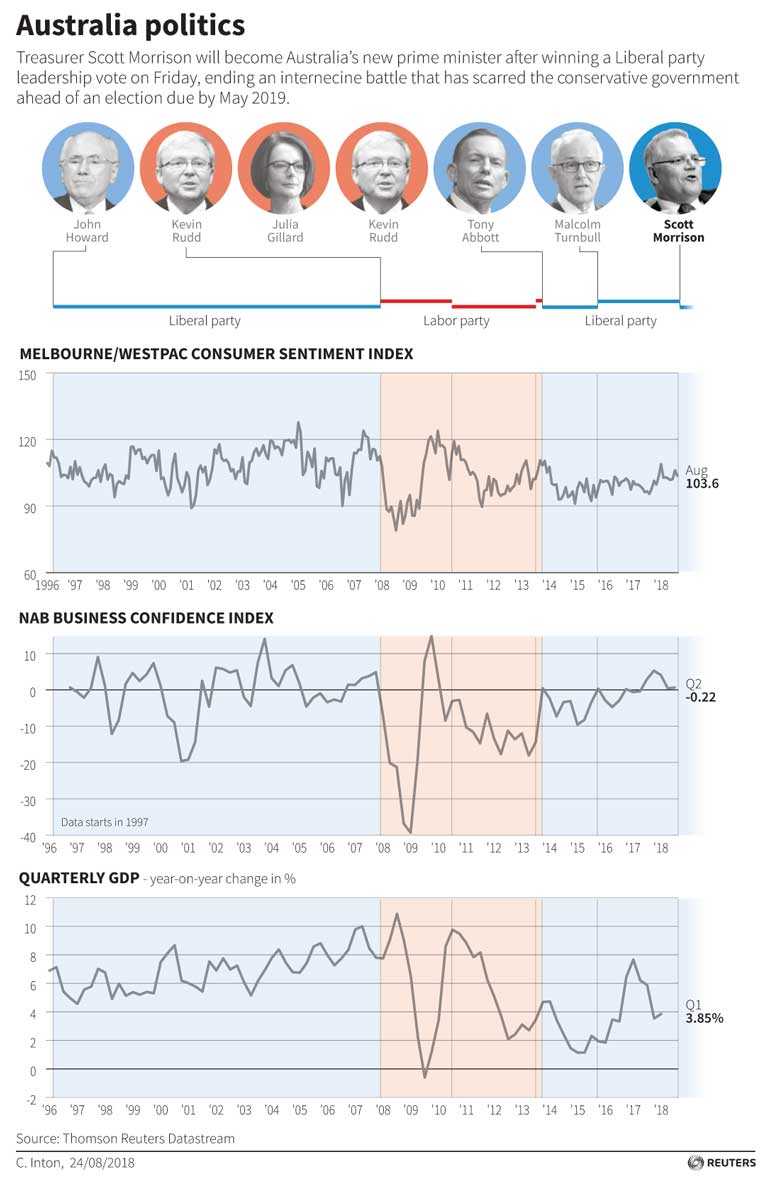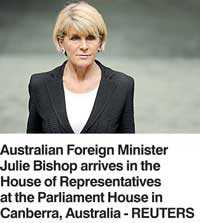Thursday Feb 19, 2026
Thursday Feb 19, 2026
Monday, 27 August 2018 12:00 - - {{hitsCtrl.values.hits}}
CANBERRA (Reuters): New Australian Prime Minister Scott Morrison promised generational change in the warring Liberal party on Friday, seeking to end an internecine battle that has scarred the conservative government ahead of an election due by May 2019.
Morrison, who was treasurer under outgoing prime minister Malcolm Turnbull, emerged the surprise winner in a three-way challenge for the leadership of the Liberal party brought on by a right-wing rival this week.
Stepping up to become Australia’s sixth prime minister in less than 10 years, Morrison has inherited leadership of a coalition between the Liberal and National parties whose one-seat majority will have to be defended when a by-election is held for a safe Sydney seat that Turnbull is set to vacate.
“Our job ... as we take forward this mantle of leadership as a new generation, is to ensure that we not only bring our party back together, which has been bruised and battered this week, but that ... we bring the parliament back together,” Morrison said in his first appearance after his party-room victory.
“The new generation of Liberal leadership is on your side,” he told Australian voters, many of whom are angry and frustrated with a decade of political instability in which no sitting prime minister has lasted a full term.
Morrison was sworn into office shortly after 6 p.m. (0800 GMT) on Friday.
He ruled out calling a general election in the near term but will still face an early electoral test, as Turnbull is set to resign from parliament, forcing a by-election in a Sydney seat that has been a safe seat for the Liberals.
Turnbull blamed his demise on “vengeance, personal ambition, factional feuding” in his party, led by conservative lawmakers including former prime minister Tony Abbott, the man he toppled in a party-room coup in September 2015.
“Australians will be dumbstruck and so appalled at the conduct of the past week,” said Turnbull.
Liberal party member Warren Entsch said after the leadership vote: “This revolving door of prime ministers has got to stop”.
Morrison’s victory marks the chance for a break from a decade of leadership clashes between Turnbull and Abbott in both government and opposition, but ideological divisions in the party over issues such as climate change, energy policy, immigration and even globalisation remain stark.
Morrison’s victory was welcomed by financial markets, which have been shaken by the political instability. Australian shares edged higher on Friday, rebounding after three days of losses that saw the benchmark fall 1.5%.

SYDNEY (Reuters): Australian Foreign Minister Julie Bishop resigned from new Prime Minister Scott Morrison’s Cabinet on Sunday, two days after a bruising leadership battle that toppled former prime minister Malcolm Turnbull and led to a major ministerial shake-up.

Bishop announced she would move to the backbench and had not yet decided whether to contest the next election, which is due by May 2019. That decision could have serious implications for Morrison’s government, which has a parliamentary majority of only one seat.
She had been foreign minister since 2013 and was replaced by former defence minister Marise Payne in the new Cabinet line-up announced by Morrison after Bishop resigned.
Morrison replaced Turnbull in a party-room vote after a week of political chaos in Canberra that marked the emergence of Australia’s sixth prime minister in less than 10 years.
He took over as leader of the Liberal Party, the senior partner in a Liberal-National coalition that has consistently trailed the opposition Labor party in opinion polls in recent months.
Bishop contested Friday’s leadership vote but was eliminated in the first round, with Morrison then emerging as a surprise compromise winner over Peter Dutton, Turnbull’s conservative challenger who brought the leadership crisis to a head earlier in the week.
“I will remain on the backbench as a strong voice for Western Australia,” Bishop said in a statement soon after she arrived back in her home state.
The possibility that Bishop could leave parliament before the next election will be a major concern for Morrison, Turnbull’s former treasurer, because it opens the possibility of another by-election being held for her seat.
His party will already have to contest a by-election for Turnbull’s harbourside electorate in Sydney, traditionally a safe Liberal seat. Turnbull’s resignation from parliament was expected in the coming week.
Morrison’s new Cabinet includes former Turnbull loyalist Christopher Pyne as the new defence minister.
Dutton, whose first challenge on Tuesday sparked the crisis that ultimately toppled Turnbull, returns as home affairs minister in an apparent attempt by Morrison to rebuild unity in his badly bruised party.
However, his portfolio will no longer include immigration, a politically sensitive issue in Australia because of the hardline approach taken by successive governments against asylum seekers who attempt to arrive illegally.
That policy includes the detention of asylum-seekers on remote Pacific islands such as Nauru, a policy that has had bipartisan support but which has been harshly criticised by the United Nations and human rights groups.
Morrison had already announced his Liberal deputy Josh Frydenberg, the former energy minister, would take over as treasurer. He said Angus Taylor, a Dutton supporter, would be the new energy minister.